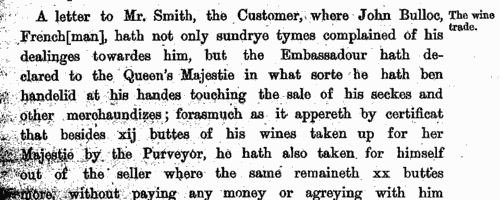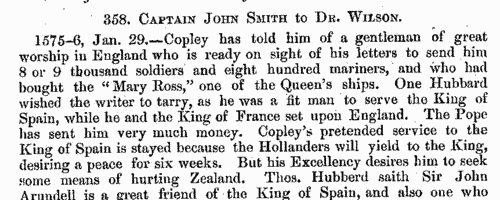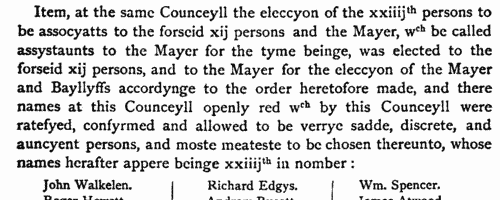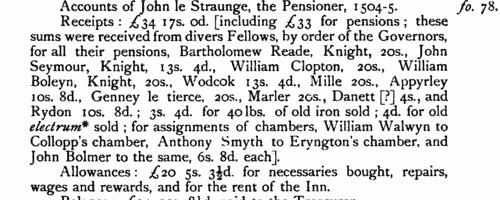Add this eBook to your basket to receive access to all 926 records. Our indexes include entries for the spelling forrest. In the period you have requested, we have the following 926 records (displaying 11 to 20): These sample scans are from the original record. You will get scans of the full pages or articles where the surname you searched for has been found. Your web browser may prevent the sample windows from opening; in this case please change your browser settings to allow pop-up windows from this site. Liegemen and Traitors, Pirates and Spies
(1558-1570)
The Privy Council of queen Elizabeth was responsible for internal security in England and Wales, and dealt with all manner of special and urgent matters
| Sample scan, click to enlarge

| Aliens in London (1571)
'The Reporte of the Searche of all the Straungers wythin London and Southwerk and the Liberties therof, made the xth daye of November, 1571'. The search found a total of 4,631 aliens living in the city, the great majority (3,643) being Dutch, 657 Frenchmen, 233 Italians &c. Arranged by parish and ward the report lists each householder by full name, where born, whether a denizen, (often) additional details, and how many aliens were in the household, and religion. This index includes also persons mentioned incidentally, such as employers. SP 12/82. Where there is a pair of scans for a single entry, the first gives the heading for the ward or parish.
| Sample scan, click to enlarge

| Scottish litigants, rebels and cautioners
(1569-1578)
The Privy Council of Scotland exercised a superior judicial authority in the kingdom, and consequently received and dealt with a constant stream of petitions, as well as dealing with the internal security of the state. This register of the council from July 1569 to June 1578, in the reign of king James VI, was edited by John Hill Burton, Historiographer Royal for Scotland, and published under the direction of the Lord Clerk Register of Scotland in 1878. Some of the individuals mentioned are the complainants, those of whom they complained, and the sureties on both sides: at this period, some of the complainants are alleging serious attacks, often of a feuding nature. Many of the bonds entered into by the cautioners are promises to keep the peace towards such enemies. Failure to answer to the council when summoned was a serious contempt, leading to being denounced a rebel, with serious consequences. But 'horning' was also used in the pursuit of debts: there was no imprisonment for debt in Scotland, but a creditor could have an obstinate debtor ordered, in the sovereign's name, to pay what was due, failing which, the debtor could be put to the horn, denounced as a rebel, and imprisoned as a rebel.
| Sample scan, click to enlarge

| Official Papers
(1547-1580)
The State Papers Domestic cover all manner of business relating to England, Ireland and the colonies, conducted in the office of the Secretary of State as well as other miscellaneous records.
| Sample scan, click to enlarge

| Cecil Manuscripts
(1572-1582)
Letters and papers of William Cecil lord Burghley, Lord Treasurer. Includes some other material as early as 1553. | Sample scan, click to enlarge

| Citizens of Oxford
(1509-1583)
These selections from the Oxford city records were printed in 1880 under the direction of the Town Clerk. Much of the material comes from the council minutes: 24 common councillors were elected out of the citizens at large each 30 September. Apart from the general administration of the city, a large number of cases involve people brought before the Council for using improper language, or other misbehaviour. There is an almost unbroken series of hanasters, or admissions to freedom of the city, listing the names of those who by purchase, birth or apprenticeship were admitted to the guild merchant. | Sample scan, click to enlarge

| Yorkshire Feet of Fines
(1571-1584)
Pedes Finium - law suits, or pretended suits, putting on record the ownership of land in Yorkshire | Sample scan, click to enlarge

| Scottish litigants, rebels and cautioners
(1578-1585)
The Privy Council of Scotland exercised a superior judicial authority in the kingdom, and consequently received and dealt with a constant stream of petitions, as well as dealing with the internal security of the state. This register of the council from 17 June 1578 to 31 July 1585, in the reign of king James VI, was edited by David Masson, and published under the direction of the Lord Clerk Register of Scotland in 1880. Some of the individuals mentioned are the complainants, those of whom they complained, and the sureties on both sides: at this period, some of the complainants are alleging serious attacks, often of a feuding nature. Many of the bonds entered into by the cautioners are promises to keep the peace towards such enemies. Failure to answer to the council when summoned was a serious contempt, leading to being denounced a rebel, with serious consequences. But 'horning' was also used in the pursuit of debts: there was no imprisonment for debt in Scotland, but a creditor could have an obstinate debtor ordered, in the sovereign's name, to pay what was due, failing which, the debtor could be put to the horn, denounced as a rebel, and imprisoned as a rebel. The main text (to page 762) is from the Acta Secreti Concilii, containing the minutes of the Privy Council, and of occasional Conventions of the Estates. After that are printed some miscellaneous Privy Council documents from the same years. The sources most productive of names, the Acta Cautionis and Registration of Bands, are also the most repetitive in form, and are not transcribed verbatim and literatim: nevertheless, one of the editor's rules was for 'All proper names and names of places occurring in the originals to be preserved in the abstracts without exception, and in the exact original spelling.'
| Sample scan, click to enlarge

| Lawyers and officers of Lincoln's Inn
(1422-1586)
Lincoln's Inn is one of the ancient inns of court in London exclusively invested with the right to call lawyers to the English bar. The Black Books of Lincoln's Inn are the main administrative records of the society, containing the names of those filling the different offices year by year; the annual accounts of the Pensioner and the Treasurer; regulations; punishments and fines for misdemeanours. This edition, printed for the Inn in 1897, covers the first five surviving volumes. | Sample scan, click to enlarge

| Anglo-Scottish relations
(1509-1589)
The State Papers Relating to Scotland is the collection of English government documents dealing with relations with Scotland when the latter was still an independent country.
| Sample scan, click to enlarge

|
Research your ancestry, family history, genealogy and one-name study by direct access to original records and archives indexed by surname.
|











